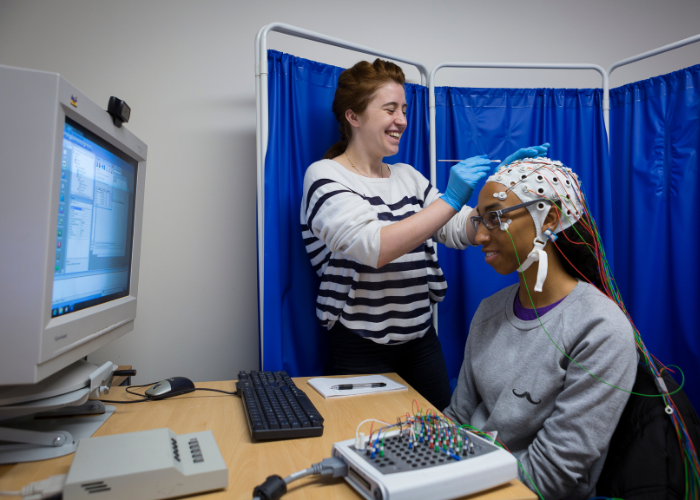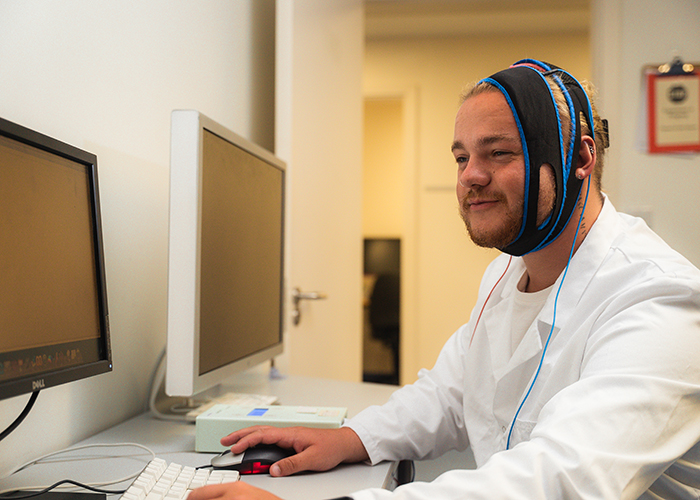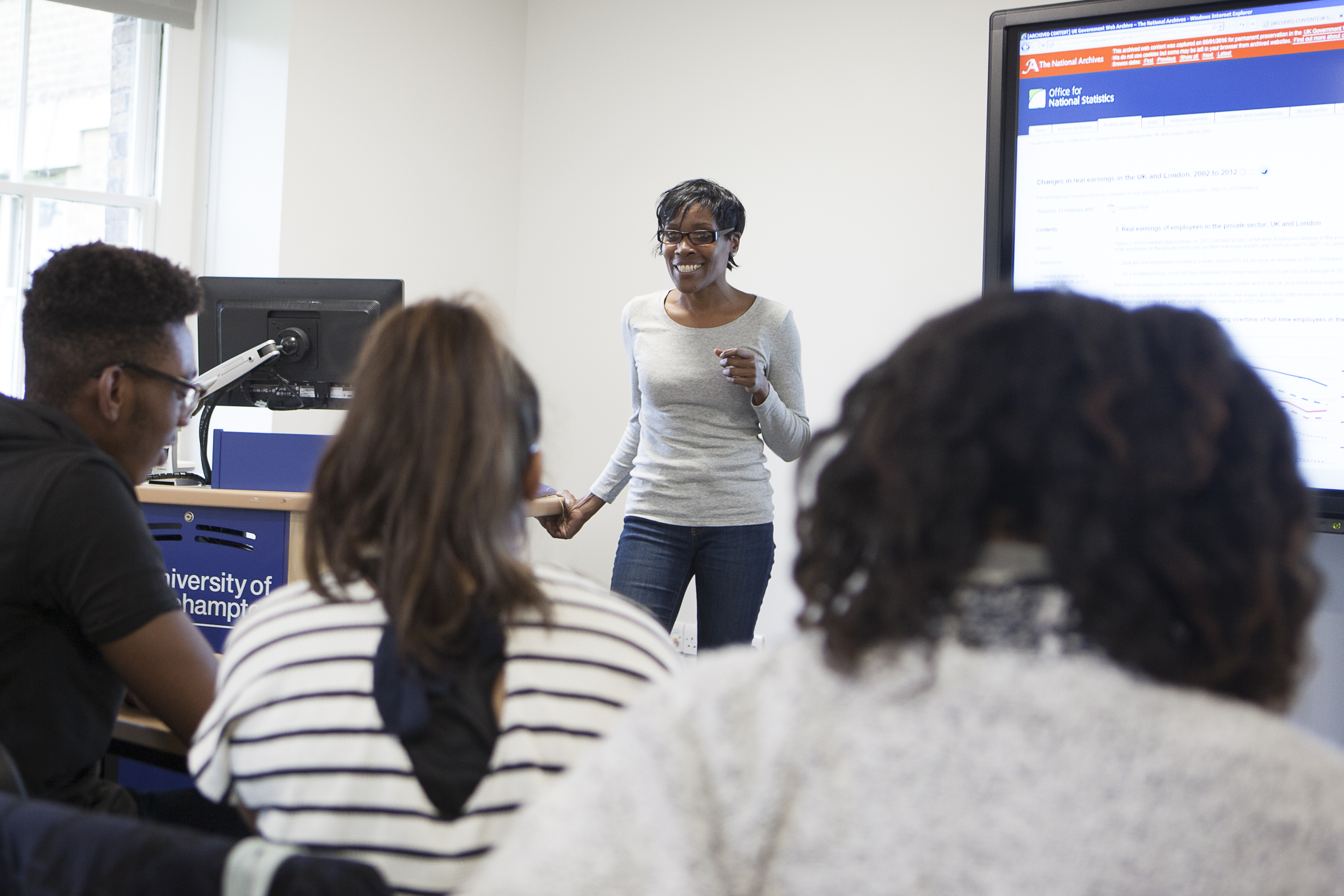Welcome to our BSc Psychology and Cognitive Neuroscience and discover how we think, learn, and perceive the world around us. Delve into the cutting-edge research, neuro-imaging techniques, and cognitive psychology principles that underpin this dynamic field.

Entry Tariff
112 UCAS points (or equivalent)
Foundation Year entry: 64 UCAS points (or equivalent)
UCAS Code
C820
C821 (if choosing Foundation Year)
Duration
3 years (full-time)
4 years (full-time) if opting for the additional placement year
4 years (full-time) if opting for Foundation Year entry
Start date
September 2024
Degree Type
BSc (single honours)
Modules
This is a new course for September 2024. More details regarding modules will be added shortly. Please contact us if you have any questions.
This course is offered as a degree with foundation year – a four-year programme which provides an additional foundation year at the beginning of the degree, that will give you academic and practical experience, as well as the skills you need to ensure you are equipped to successfully complete your chosen degree.
£2,000 Foundation Scholarships for all home students
Find out more about our degrees with a foundation year
Psychology of Resilience and Success
Introduction to Psychological Research
The Evolution of Psychology
Understanding Human Behavior
Understanding the Brain
Topics and Techniques in Neuroscience
Cognitive Psychology and Neuroscience
Understanding the Individual and Society
Development and Transitions Across the Lifespan
Psychological Research: Design, Analysis and Impact
Research and Experiments in Cognitive Neuroscience
Applied Neuroscience
This course offers all students the option of a one-year paid work placement, to boost your employability even further. If you choose this route, you will take the placement following year two of your course, and then return to complete your degree.
Why take a placement?
A placement year is the perfect opportunity to gain valuable work experience, to build on the career skills we will teach you on this degree. The connections you make on the placement will improve your career prospects further, and equip you with the skills you need to secure graduate-level employment.
How we support you
The University's Placement and Work Experience Team are experts at helping you to secure a placement. They will work closely with you from the start, helping you research potential employers, discover placement opportunities, create and pitch your CV, and will coach you to perform well in interviews. We aren't able to guarantee a placement, but our sector-leading advisors will give you the best possible chance of securing one.
Find out more about how we'll support you
We understand that your plans might change once you start your programme. If you decide not to do a placement, you will have the option of completing the three year version of your programme.
Whatever your choice, you will have access to many opportunities for work experience through our Placement and Work Experience Team, and access to face-to-face and 24/7 online careers support.
Psychological Practice for Communities and Industry
Neuropsychology
Independent Research Project
Developmental Cognitive Neuroscience
Neuroscience of Health and Illness
Why this course
Dedicated work experience and placement opportunities with our industry partners.
Learn from expert researchers in the field, including leading psychologists and cognitive neuroscientists.
Access to our state-of-the-art lab facilities.
Skills

Cognitive neuroscientists explore how the brain and connections in the brain influence our mental processes, including our memory, perceptions and reasoning. Psychologists examine the developmental, psychological and environmental factors that influence our behaviour. This exciting, unique degree will give you the skills to understand the relationship between the human brain and our behaviour, and which areas of the brain support these cognitive functions.
As a Roehampton student, we will ensure you graduate with an expert skillset. This includes:
- In-depth understanding of human behaviour and the functioning of the brain and its systems.
- Advanced skills in critical reasoning, analysis, and research as well as interpersonal and communication skills.
- Professional experience through our work experience module, so you can apply your knowledge and professional skills to your chosen workplace.
How you'll learn
Your learning is tailored to the specific demands of the field of professional psychology and cognitive neuroscience. This includes:
- Lectures: develop a critical understanding of theory and empirical research.
- Seminars and workshops: put your learning into practice with your tutors and fellow students.
- Laboratory practicals: learn and apply advanced laboratory skills.
- Discussions, debates and group projects: explore psychology and cognitive neuroscience in the real world, as well as the latest advancements in the field.
Check out the state-of-the-art psychological laboratories where you will be studying.

Professional opportunities
Accreditation by the British Psychological Society:
This programme is seeking accreditation by the British Psychological Society (BPS). This means, if you graduate with at least a 2:2 you’ll be eligible for Graduate Basis for Chartered Membership (GBC) of the BPS – which is an essential first step if you want to go on to become a Charted Psychologist.
The University of Roehampton London’s BSc Psychology has been accredited and commended by the BPS for many years. This new, innovative programme is pending accreditation, and has been designed to meet BPS criteria. This also means our teaching is of the highest standard, and you’ll receive excellent levels of support within our School.
How you'll be assessed

Through your specialised understanding of psychology and cognitive neuroscience, you’ll become an expert in applying theory to the real-world, advancing your academic and professional skills.
You’ll complete portfolios, case studies, presentations and research studies, which replicate the working world of neuroscience and prepare you for your career.
In your third year you’ll also complete an independent research project, allowing you to specialise and explore an area of psychology and cognitive neuroscience you are passionate about.
Upcoming Events:
Career options
You’ll be prepared to go into a range of careers and industries. This includes:
- Scientific research and teaching in neuroscience and psychology.
- Further study in order to become a forensic, health, counselling, sport, occupational, educational or clinical psychologist.
- Pharmaceutical industry, including drug development, biotechnology and bioinformatics.
- Clinical and Healthcare sector.
- Data science.
- Health Science and Health Services Research.
- Science communication, including museum work, public engagement and scientific publishing.
Your potential roles could be:
- Clinical Research Assistant
- Biotechologist
- Pharmaceutical researcher

Application Info
How to apply
Undergraduate programmes
- September 2024 entry: Home (UK) students – apply through UCAS (Roehampton UCAS institution code is R48)
Apply now for September 2024 entry through UCAS
- September 2024 entry: International students- apply using our direct application form
Apply now for September 2024 entry
If you need any help or advice with your application, or just want to ask us a question before you apply, please do not hesitate to contact us.
We welcome applicants with a wide range of qualifications, including BTECs, A-levels and T Levels.
When we consider applications to study with us, we form a complete view of your achievements to date, and future potential. In some cases, we will make you a contextual offer. Contextual offers ensure that all applicants have a fair opportunity of gaining a place with us, regardless of their background. Find out more about contextual offers.
Detailed advice on applying for an undergraduate degree is available on our How to apply page.
Specific Entry Requirements
GCSE (or equivalent) requirement: Maths, Grade C/4.
General entry requirements
Validation and curriculum review
What is validation?
Validation is a formal process through which the University approves a programme (content, teaching, learning and assessment) as being of appropriate standard and quality. This is a normal process used throughout the university sector.
The University expects to publish details of the validated programme in the academic year prior to the start date of the programme. You are advised to check the University website at that time to ensure that you have up-to-date information. In the meantime, if you require information you should contact 0208 392 3232.
What is curriculum review?
Curriculum review is the regular and systematic monitoring and reviewing of programmes. It is a normal process in the sector and it is the way by which the university ensures that your course remains up-to-date and relevant. The process may result in changes to the content, structure and/or assessment of the programme.
The University expects to publish details of the re-validated programme by 31 March in the academic year prior to the start date of the programme. You are advised to check the University website at that time to ensure that you have up-to-date information. In the meantime, if you require information you should contact 0208 392 3232.
Contextual offers
When we consider applications to study with us, we form a complete view of your achievements to date, and future potential, and can offer flexibility in entry requirements.
Find out more